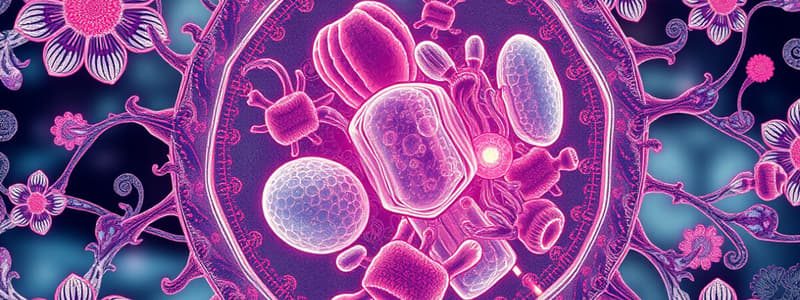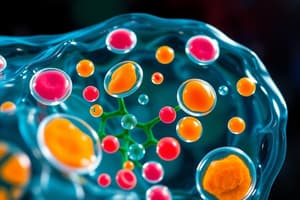Podcast
Questions and Answers
Which of the following statements about cell division is true?
Which of the following statements about cell division is true?
What distinguishes eukaryotic cells from prokaryotic cells?
What distinguishes eukaryotic cells from prokaryotic cells?
What role do ribosomes play in a cell?
What role do ribosomes play in a cell?
How many pairs of chromosomes do humans have?
How many pairs of chromosomes do humans have?
Signup and view all the answers
What is the function of the Golgi apparatus in a cell?
What is the function of the Golgi apparatus in a cell?
Signup and view all the answers
What is the significance of the Law of Independent Assortment in genetics?
What is the significance of the Law of Independent Assortment in genetics?
Signup and view all the answers
Which organelle is primarily involved in detoxification processes?
Which organelle is primarily involved in detoxification processes?
Signup and view all the answers
In DNA structure, which of the following base pairings is correct?
In DNA structure, which of the following base pairings is correct?
Signup and view all the answers
Flashcards are hidden until you start studying
Study Notes
Cell Biology
-
Cell Theory
- All living organisms are composed of cells.
- The cell is the basic unit of life.
- All cells arise from pre-existing cells.
-
Types of Cells
- Prokaryotic: Lack a nucleus, smaller in size (e.g., bacteria).
- Eukaryotic: Have a nucleus and organelles, larger (e.g., plant and animal cells).
-
Cell Organelles
- Nucleus: Contains genetic material (DNA).
- Mitochondria: Powerhouse of the cell, site of ATP production.
- Ribosomes: Sites of protein synthesis.
- Endoplasmic Reticulum (ER):
- Rough ER: Studded with ribosomes; involved in protein synthesis.
- Smooth ER: Lacks ribosomes; involved in lipid synthesis and detoxification.
- Golgi Apparatus: Modifies, sorts, and packages proteins and lipids.
- Lysosomes: Contain enzymes for digestion.
- Cell Membrane: Semi-permeable barrier that regulates entry and exit of substances.
-
Cell Division
- Mitosis: Process of cell division for growth and repair, resulting in two identical daughter cells.
- Meiosis: Specialized form of cell division that leads to the production of gametes (sperm and egg); involves two rounds of division.
-
Cell Communication
- Signaling pathways: Cells communicate via chemical signals (hormones, neurotransmitters).
- Receptors: Proteins on cell surfaces that bind to signaling molecules.
Genetics
-
DNA Structure
- Composed of nucleotides (adenine, thymine, cytosine, guanine).
- Double helix structure, held together by base pairing (A-T, C-G).
-
Genes and Chromosomes
- Genes: Segments of DNA that code for proteins.
- Chromosomes: Structures that organize DNA; humans have 46 chromosomes (23 pairs).
-
Mendelian Genetics
- Principles of inheritance discovered by Gregor Mendel:
- Law of Segregation: Alleles segregate during gamete formation.
- Law of Independent Assortment: Genes for different traits are inherited independently.
- Principles of inheritance discovered by Gregor Mendel:
-
Genetic Variation
- Sources of variation include mutations, sexual reproduction, and genetic recombination.
-
Biotechnology in Genetics
- DNA Cloning: Creating copies of DNA segments.
- CRISPR: A gene-editing technology that allows for precise modifications of the genome.
- Genetic Testing: Identifies mutations associated with genetic disorders.
-
Population Genetics
- Study of genetic variations within populations and how they change over time.
- Key concepts: Allele frequency, Hardy-Weinberg equilibrium, genetic drift, and natural selection.
Cell Biology
- Cell Theory posits that all living organisms consist of cells, with the cell serving as the fundamental unit of life, and that all cells originate from pre-existing cells.
- Types of Cells
- Prokaryotic cells are smaller, lack a nucleus, and include organisms such as bacteria.
- Eukaryotic cells are larger, contain a nucleus and organelles, and can be found in plants and animals.
- Cell Organelles
- Nucleus: Stores genetic material (DNA).
- Mitochondria: Often referred to as the powerhouse of the cell, responsible for ATP production.
- Ribosomes: Sites where protein synthesis occurs.
- Endoplasmic Reticulum (ER):
- Rough ER is covered with ribosomes and plays a crucial role in protein synthesis.
- Smooth ER is ribosome-free and focuses on lipid synthesis and detoxification processes.
- Golgi Apparatus: Modifies, sorts, and packages proteins and lipids for transport.
- Lysosomes: Organelles that contain digestive enzymes to break down waste materials.
- Cell Membrane: A semi-permeable barrier that regulates the entry and exit of substances, maintaining homeostasis.
- Cell Division
- Mitosis: A process that enables growth and repair, producing two identical daughter cells.
- Meiosis: A specialized division that creates gametes (sperm and egg), involving two successive division rounds.
- Cell Communication
- Cells utilize signaling pathways to communicate through chemical signals like hormones and neurotransmitters.
- Receptors are proteins on cell surfaces that interact with these signaling molecules.
Genetics
- DNA Structure
- DNA is made up of nucleotides, specifically adenine (A), thymine (T), cytosine (C), and guanine (G), and forms a double helix held together by base pairing (A with T, C with G).
- Genes and Chromosomes
- Genes are segments of DNA coding for proteins, while chromosomes organize DNA; humans have 46 chromosomes, arranged in 23 pairs.
- Mendelian Genetics
- Gregor Mendel established key inheritance principles:
- Law of Segregation: Alleles separate during the formation of gametes.
- Law of Independent Assortment: Genes for different traits are inherited independently of one another.
- Gregor Mendel established key inheritance principles:
- Genetic Variation
- Variation arises from mutations, sexual reproduction, and genetic recombination.
- Biotechnology in Genetics
- DNA Cloning: Involves creating replicas of DNA segments.
- CRISPR: A frontier editing technology that allows for targeted changes to the genome.
- Genetic Testing: Techniques used to identify mutations linked to genetic disorders.
- Population Genetics
- This field studies genetic variations within populations, focusing on changes over time, including concepts like allele frequency, Hardy-Weinberg equilibrium, genetic drift, and natural selection.
Studying That Suits You
Use AI to generate personalized quizzes and flashcards to suit your learning preferences.
Description
Explore the fundamentals of cell biology, including cell theory, types of cells, organelles, and cell division processes. This quiz covers crucial concepts like prokaryotic and eukaryotic cells, the function of organelles, and the stages of mitosis. Test your knowledge and deepen your understanding of the basic unit of life.




